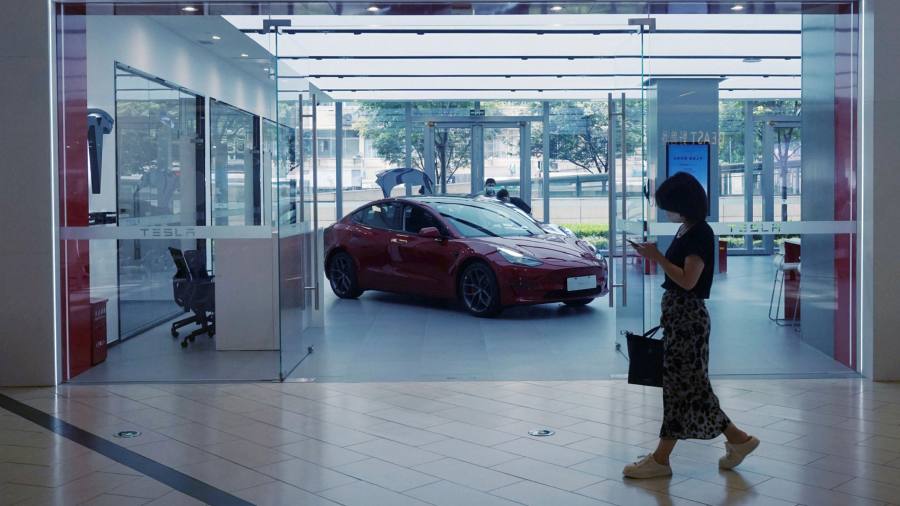Tesla cannot unsync from the politics of US-China relations

The writer is founder of Sifted, an FT-backed media company covering European start-ups
Tesla’s drivers tend to come for the hardware and stay for the software. In the words of one fan, Tesla’s powerful, sleekly designed cars have turned electric vehicles from vegetables you should eat into a dessert you desire. But they are also bursting with smart (and silly) software that provides functionality and fun.
Its autopilot system, which is used for parking and cruise control and may one day enable fully autonomous driving, boasts eight cameras, 12 ultrasonic sensors and radar powered by an onboard computer with a proprietary neural net. Tesla’s latest models even offer an updated “emissions testing mode” that can play a “gassy prank” on anyone in your car. Its fart noises, jokily named after chief executive Elon Musk’s other corporate interests, include: a Falcon Heavy, a Neurastink and a Boring Fart.
But not everyone finds Tesla’s software funny. The Chinese authorities have just banned the use of Teslas in Beidaihe, the coastal resort where the Communist party leadership holds a secretive summer conclave. The cars have previously been restricted around military complexes and housing compounds and were prevented from entering Chengdu during last month’s visit by Chinese president Xi Jinping. Senior military staff and officials from important state-owned enterprises have also been told to stop driving them to work.
The fear appears to be that Tesla cars, stuffed with cameras and sensors, make perfect spies on wheels. Recent reports suggest Chinese security officials are particularly concerned about the in-car camera that monitors the driver. They also worry about data leaks from synced mobile phones. As is the way in our modern world, cars have evolved from simple consumer products into complex privacy and national security risks.
Tesla has been at pains to allay such concerns. China is a vital market for Tesla: its Shanghai gigafactory manufactured about half the 936,000 vehicles the company delivered last year. The company says its privacy protection policy complies with Chinese law. The company has also insisted it does not export any data gathered from its cars in China outside the country. In March, Musk told the China Development Forum that Tesla would be “shut down everywhere” if it used the technology in its cars for spying.
Yet the nervousness of the Chinese security officials is understandable. Even if Tesla scrupulously abides by Chinese strictures, it does not mean others cannot theoretically hack its systems, difficult though that may be. Tesla’s autopilot system collects enormous amounts of visual and geolocation data that is used to improve its corporate “hive mind”. “This system provides a view of the world that a driver alone cannot access, seeing in every direction simultaneously, and on wavelengths that go far beyond the human senses,” Tesla says. Chinese sensitivities have been heightened by the recent hacking of a Shanghai police database that could expose the personal data of more than 1bn people.
Chinese officials have also grown increasingly suspicious about Musk’s role in giving Ukraine access to Starlink satellites operated by his SpaceX company during the war with Russia and his links to the US space military-industrial complex. In May, China Military Online, the official publication of the People’s Liberation Army, warned that Starlink might be exploited by the “hegemony-obsessed US” to bring “chaos or calamity” to the world. Just as the Chinese telecoms equipment company Huawei has been targeted by western security officials, so Tesla risks becoming the punchbag of their Chinese counterparts.
Two broader lessons can perhaps be drawn from Tesla’s China dilemma. First, software vulnerabilities can represent an existential risk to any car company that fails to ensure driver safety and secure their data. In 2015, Chrysler was forced to recall 1.4mn vehicles to patch a software vulnerability identified by two security researchers, who had been able to hack a Jeep Cherokee remotely, messing with its air conditioning, radio and windscreen wipers before cutting its transmission. It is easy to imagine far worse. Software has not been the traditional skill set for metal bashers and they have had to learn fast.
Second, in an increasingly datafied world, there is no such thing as an apolitical company. To date, Musk has played an artful game in China hailing the country’s economic achievements, ostentatiously abiding by its data laws and steering clear of politics. Musk’s many fans there still applaud the entrepreneur as the “Silicon Valley Iron Man”. Yet, as he is rapidly discovering, Tesla’s connected cars are also connected to geopolitics.